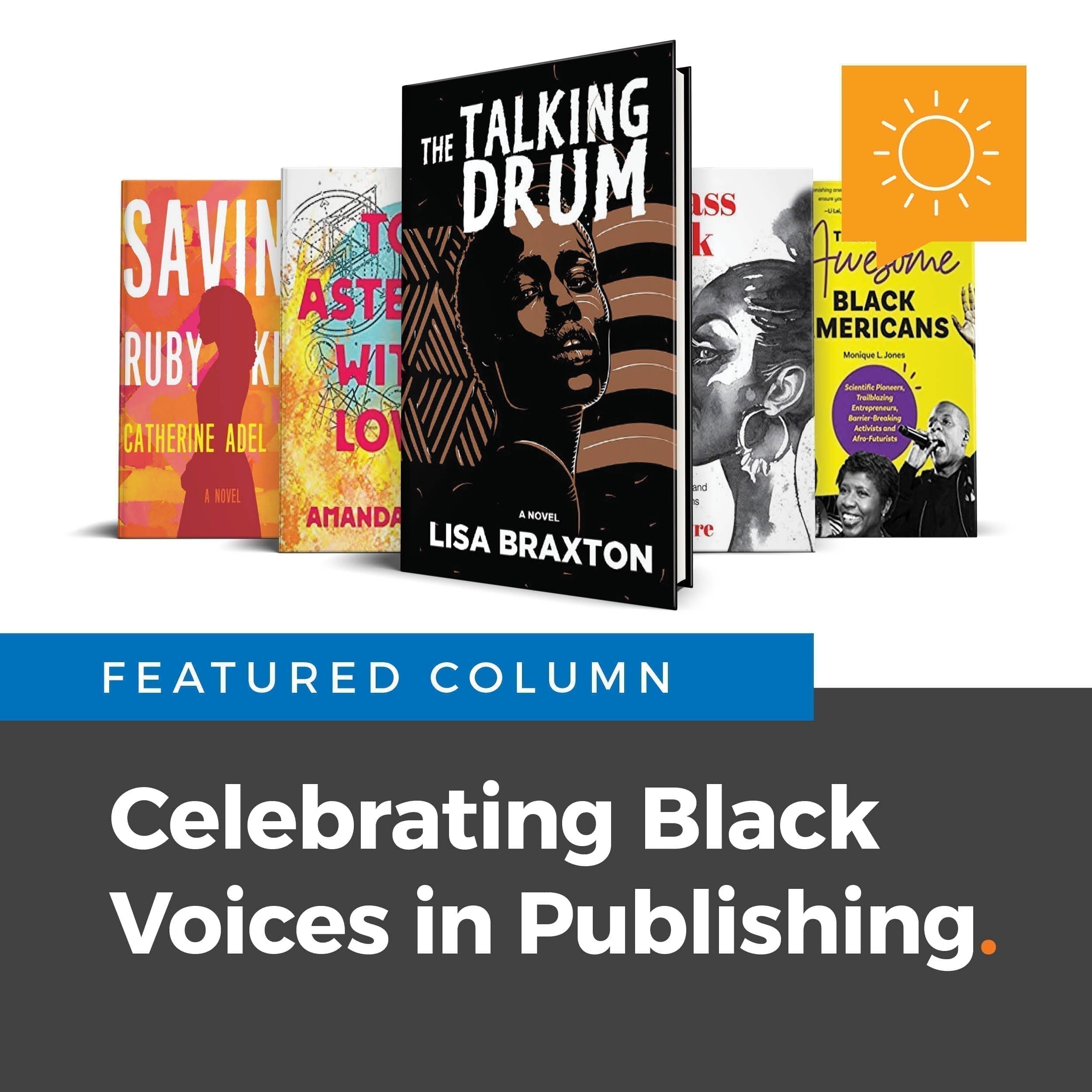Feature: Celebrating Black Voices in Publishing.

At this cultural moment, elevating black voices and understanding the history of racism in this country is more important than ever. Recent strides including #PublishingPaidMe exposing racial disparities in book advances, #BlackoutBestsellerList drawing attention to Black authors and Black book professionals, and novels like The Hate You Give and Such a Fun Age putting race, privilege, and black experience at the forefront, have drawn attention to heavy topics and sparked much needed conversations. Authors of color speak about recent issues and how continuing to write on these topics should be supported and celebrated now more than ever.
Lisa Braxton, Author of The Talking Drum: I recently wrote an essay that was published in an online news publication about the racism I’ve experienced in my community. White co-workers who had worked with me for years were astonished when they read it. They had no idea what I’d gone through. Many of them shared the essay with their social media followers describing it as a “must read” that they hoped would further the understanding of what black Americans deal with on a regular basis and serve as a mirror for racist offenders.
Take that reaction and multiply it tenfold and that’s what a book can do. Black writers are creating a tremendous amount of work, but publishing houses have largely shut them out. Now that the public is encouraged to read black books and the publishing industry is vowing to improve diversity within its ranks with an eye on better representation of black books within its lists, I’m hoping that these books by gifted black writers can reach a wider audience and lead to a better understanding of the black experience in all of its forms.
My novel, The Talking Drum, touches on police brutality, housing discrimination, racism, and injustice, and features black characters from different currents of the African Diaspora—African Americans, Caribbean Americans, and recent African immigrants. People across racial lines may not feel comfortable breaking bread together, sitting in the same sanctuary on Sunday morning, visiting in each other’s homes, but they might just pick up a book about an experience that is not their own. I hope this reading will serve as a catalyst for important conversations leading to improved race relations
Amanda Ross, Author of To Astera, With Love: We are living in unprecedented times — as we fight a war with Coronavirus which is disproportionately affecting Black and brown communities, we are also fighting for Black lives on a worldwide scale. This battle to end systemic racism has trickled through every area of American life, from the justice system to the publishing industry and even to the ballot box. Writers often infuse their stories with things that they know, even in fantasy novels.
When I wrote my book, To Astera, With Love, I wanted to address the things I experienced and saw on a near daily basis — racism, sexism, homophobia, and xenophobia. The result is a tale that features a Black witch fighting for equality in a society where a vampire President has a cult-like following, where witches are demonized for abilities they did not choose, but where collective voices and actions can start to chip away at the systems that reinforce inequality.
For writers, part of the thrill of putting pen to paper is to see a world you’ve longed to see come to fruition. This is especially true for Black authors, since our stories are often not told or they are told through other people’s lenses. It is always important for stories encompassing the full breath of the Black experience to be told, but now more than ever those stories have the power to ignite change, make people reexamine the way they move through the world, and provide much needed joy.
Catherine Adel West, Author of Saving Ruby King: Black people have been shouting. For days. For weeks. For decades. For centuries. We’ve used pretty much every means at our disposal to protest injustice. For me, my debut novel “Saving Ruby King” calls out the insidious cancers of racial injustice and police brutality. However, readers must recognize this book and others like it are so much more than these subjects. African Americans deal with racism and police brutality, but we also love and laugh and live outside of the bonds and boundaries in which many would like to trap us.
The importance of sharing black stories can’t be overstated. It’s a way to hold up a mirror to America. It is a way to peel back layers and expose the root of social injustice. We can’t move forward as a nation without doing this. However, two of the problems black writers face are the infrastructure needed to bring out stories to a wider audience is extremely flimsy and the compensation afforded to us while making these artistic strides is still sorely lacking – especially for someone like me who is a writer of adult fiction. Hashtags like #PublishingPaidMe brought to light disparities BIPOC writers have known all along existed. Now whether publishing was at the best naïve or at the worst complicit in continuing these unequitable policies remains to truly be confirmed, but what is known is our stories matter, BLACK stories matter. They are valid and we have a right to be heard and paid what we’re worth.
M.J. Fievre, Author of Badass Black Girl: These past few months have been difficult to say the least. Between the pandemic and all the protests over George Floyd’s, Breonna Taylor’s, and Ahmaud Arbery’s murders, it has been hard to catch a breath. I just keep thinking to myself, No, not again. How could this be happening again? My days were feeling quite heavy during the height of the riots, when all the rhetoric seemed so counterproductive, like we (the people) will never reach an accord. So many people seemed to be dickering over the phrase “Black Lives Matter.” And I’ve learned the hard way, some people just don’t want to listen. But I want Black lives to matter.
Then I read accolades for Colson Whitehead’s novel The Nickel Boys, which is based on a real reform school for Black boys in the Florida Panhandle that operated during Jim Crow. They found a mass grave among other horrors at that school when it was shut down. And I thought, Wow, now those Black boys who went to that school, they’re finally going to be acknowledged, they’re going to matter, and I began to really appreciate what Whitehead is doing with his historical fiction. I think it’s terribly important work because it creates empathy for a group of people who saw so little love in their lives. It gives the reader an opportunity, in a way, to go back in time and think long and hard about how Black people have been treated, and it makes the lives of those boys matter.
I’d like to see more work like Whitehead’s that explores difficult subjects and brings dark chapters from our history to light. Historical fiction has a magical ability to create empathy where Facebook posts and Twitter feeds fail. And I think it’s important for our Black youth coming of age now to have stories they can relate to, not just like the boys in Whitehead’s reform school, but also, strong, determined figures from our past that persevered when the going was almost more than they could bear. In a way, historical fiction about Black people does the work of ensuring that Black lives matter, because it touches people in a very deep way. Monuments are falling now, and people are moaning about losing history. I say write more Black historical fiction based on the truth, and give readers something they can empathize with. We might end up being kinder to one another if we were reading books instead of staring at bronze statues.
I wrote Badass Black Girl because I wanted the generation of young women growing up now to have a guide to understanding systemic racism and to have tools to fight not only the racism, but the everyday pressure that often comes with being Black in this society. A big part of the book is helping Black girls find role models who inspire them and trailblazers who never let the word “no” settle into their consciousness for very long—these are women, for example, who first went to medical school when only a few years before Black women weren’t even allowed to read books in big parts of the country. I’d like to see more strong women like them in historical fiction, because along with empathy, Black people need to believe they are powerful and can accomplish astonishing things, and really, we’re just getting started.
Monique L. Jones, Author of The Book of Awesome Black Americans: I recently wrote about Lin-Manuel Miranda’s musical, Hamilton, for my website, JUST ADD COLOR. While I have my issues with the musical, I recognized the importance of historical fiction and how it can open an audience’s minds to thinking about and reconceptualizing the past, particularly when it comes to learning about different viewpoints and forgotten histories.
Of course, Alexander Hamilton’s life is the source material for Hamilton, so the musical isn’t wholly fiction. However, the film is cast with people of color, turning the story into a reclaimed narrative for people of color. It’s an experiment that allows viewers, viewers of color, in particular, to imagine themselves in, as the musical states, “in the room where it happens.”
Similarly, my book, The Book of Awesome Black Americans, is based on fact. In my book, I discuss Black American inventors, artists, environmentalists, fashion icons, and pioneers. But I hope that my writing can also help readers reconceptualize how they think about America’s history and the place people of color have in it. We have helped make this country in ways not usually thought of daily. For instance, it was slave labor that helped build the nation’s capital, as well as a free Black man–Benjamin Banneker–who surveyed what would become Washington D.C.
Reading books about the totality of America’s history, as well as works that theorize America’s multicultural future, can help America shift from a country that believes in white supremacy into a nation that focuses on the merits of the individual, regardless of where they come from or what their racial background is. Historical fiction also serves to change readers’ mindsets by arriving at the issue of racism at a different angle. Learning about slavery is one thing, but learning about it through the eyes of an enslaved child, such as Addy, a character from the American Girl series of books, paints the picture in an entirely different light. Learning about the civil rights movement of the 1960s might seem boring to some people. But it’s alive in the form of The Watsons Go to Birmingham, 1963, in which a middle-class Black family only want to have a fun family visit with their grandmother, but end up witnessing the bombing of the 16th Street Baptist Church.
Through books like this, and works like Hamilton, an audience can get shaken out of their usual thought processes and realize that people of color aren’t political objects–they are people facing monumental circumstances simply because they exist. Historical fiction puts people in the room where things happen and in the minds of the people. Once you’ve been in the mindset of someone who isn’t like you and realize you have a lot in common, you can’t conceive of that person’s mistreatment. You know that they are human just like you, and deserve the rights of any human being.

[cm_page_title title=”Continue Reading” subtitle=” Shelf Unbound”]
Article originally Published in the August/September 2020 Issue The Historic Edition.
